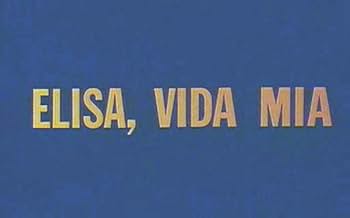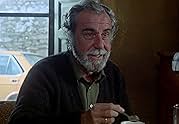Elisa, vida mía
- 1977
- 2h 5min
VALUTAZIONE IMDb
7,3/10
1047
LA TUA VALUTAZIONE
Aggiungi una trama nella tua linguaElisa hasn't seen her father Luis in nine years, but she receives a telegram from her sister at a time of crisis in their marriage informing her that her father is sick and decides to travel... Leggi tuttoElisa hasn't seen her father Luis in nine years, but she receives a telegram from her sister at a time of crisis in their marriage informing her that her father is sick and decides to travel to Madrid to visit Luis for his birthday.Elisa hasn't seen her father Luis in nine years, but she receives a telegram from her sister at a time of crisis in their marriage informing her that her father is sick and decides to travel to Madrid to visit Luis for his birthday.
- Regia
- Sceneggiatura
- Star
- Premi
- 2 vittorie e 1 candidatura in totale
Recensioni in evidenza
Basically, I'd rather be watching "Bonjour Tristesse". In other words, if you're gonna make a dysfunctional father/daughter film how about at least making it fun and/or interesting to watch, Carlos ol pal, with a bit more humor (there is virtually none) and a lot less art house symbolism, like the decomposing body of Geraldine Chaplin's spouse's lover, trembling chandeliers or bloody fish heads? And while you're at it, Carlos, how about letting loose your death grip on willful obscurity and allowing this rather distasteful tale to be told reliably and straightforwardly? Makes for a much less enervating experience, trust me. Give it a generous C plus for the fine work (as always) of Fernando Rey.
PS...Not content to make a boring Father's Day movie, five years later Saura helmed an even duller Mother's Day film, "Dulces Horas".
PS...Not content to make a boring Father's Day movie, five years later Saura helmed an even duller Mother's Day film, "Dulces Horas".
Elisa (Geraldine Chaplin) has not seen her father Luis (Fernando Rey) for nine years, but she receives a telegram from her sister Isabel (Isabel Mestres) in a moment of crisis of her marriage with Antonio (Norman Briski) telling that her father is ill and she decides to travel to the countryside of Madrid with Isabel and her brother-in-law Julián (Joaquín Hinojosa) and their two children to visit Luis for his birthday. Elisa decides to stay with his father when her sister returns to Madrid with her family and she gets closer to Luis, understanding why he left her mother years ago. Later she tells him that Antonio cheated her with her best friend Sophie and their relationship has ended. When Antonio unexpectedly arrives in the house, Elisa takes a decision about her life.
"Elisa, Vida Mía" is a beautiful movie about father and daughter relationship. The performances of Fernando Rey and Geraldine Chaplin are awesome and full of feelings. There are moments that I found confused to be understood, like the incestuous scene, but in general this drama is very nice. My vote is six.
Title (Brazil): "Elisa Vida Mia"
"Elisa, Vida Mía" is a beautiful movie about father and daughter relationship. The performances of Fernando Rey and Geraldine Chaplin are awesome and full of feelings. There are moments that I found confused to be understood, like the incestuous scene, but in general this drama is very nice. My vote is six.
Title (Brazil): "Elisa Vida Mia"
(1977) Elise, My Life/ Elisa, vida mía
(In Spanish with English subtitles)
PSYCHOLOGICAL DRAMA/ ART HOUSE
Written and directed by Carlos Saura that has adult sisters Elise (Geraldine Chaplin) and Isabel (Isabel Mestres) along with her husband, Julián (Joaquin Hinojosa) and their two children Jacobo and Arantxa arriving to visit their father, Luis (Fernando Rey) to celebrate his birthday at his isolated cottage. And while both Julián and his wife, Isabel need to go back to the city the following day for the purpose of work, Elise decides to stay behind and spend time with her father. And at this point, we find out more about Elise and her relationship with her current husband, Antonio (Norman Briski) to which she found out he was cheating on her with her best friend, Sofia. One of the reasons, she is not too keen on returning. We also see, what Luis does whenever he does go back to the city which is to teach a group of young school girls at a religious nursery. This time he takes his daughter with him as they are rehearsing a play.
The first time I saw this film on TCM, I was baffled that I dozed off a little as a result of so much dialogue. But after the second attempt, it is up for interpretation as viewers are unable to determine what is true and what isn't. This is the seventh of nine movies Geraldine Chaplin collaborated with writer/ director Carlos Saura.
Written and directed by Carlos Saura that has adult sisters Elise (Geraldine Chaplin) and Isabel (Isabel Mestres) along with her husband, Julián (Joaquin Hinojosa) and their two children Jacobo and Arantxa arriving to visit their father, Luis (Fernando Rey) to celebrate his birthday at his isolated cottage. And while both Julián and his wife, Isabel need to go back to the city the following day for the purpose of work, Elise decides to stay behind and spend time with her father. And at this point, we find out more about Elise and her relationship with her current husband, Antonio (Norman Briski) to which she found out he was cheating on her with her best friend, Sofia. One of the reasons, she is not too keen on returning. We also see, what Luis does whenever he does go back to the city which is to teach a group of young school girls at a religious nursery. This time he takes his daughter with him as they are rehearsing a play.
The first time I saw this film on TCM, I was baffled that I dozed off a little as a result of so much dialogue. But after the second attempt, it is up for interpretation as viewers are unable to determine what is true and what isn't. This is the seventh of nine movies Geraldine Chaplin collaborated with writer/ director Carlos Saura.
When Fernando Rey falls ill, his estranged daughter, Geraldine Chaplin, goes to stay with him. It's more an excuse to get away from her failing marriage to Norman Briski.
Idiosyncrasies in the story-telling convince me this is a meditation on how no two sets of memory, no two tellings of the same event, agree. It begins with Rey narrating Miss Chaplin's musings on the events. Rey explains that he fills his days with his work, teaching, and then writing. Often he burns his writing when he finds it unsatisfactory, and starts again. Later, we see Briski and Miss Chaplin discussing their life together, disagreeing about what has happened. Hasn't this happened to all of us?
There seems no hint of the political satire that so many of Carlos Saura's movies have claimed for them. This seems a more personal film, in which the implication is that just as Rey's marriage failed, so too, and for many of the same reasons, will his daughter's. Yet looking at something and finding its reasons, are not justifications. Perhaps all relationships are doomed to failure; they inevitably end, even if it only with death. Does that justify the failure?
Idiosyncrasies in the story-telling convince me this is a meditation on how no two sets of memory, no two tellings of the same event, agree. It begins with Rey narrating Miss Chaplin's musings on the events. Rey explains that he fills his days with his work, teaching, and then writing. Often he burns his writing when he finds it unsatisfactory, and starts again. Later, we see Briski and Miss Chaplin discussing their life together, disagreeing about what has happened. Hasn't this happened to all of us?
There seems no hint of the political satire that so many of Carlos Saura's movies have claimed for them. This seems a more personal film, in which the implication is that just as Rey's marriage failed, so too, and for many of the same reasons, will his daughter's. Yet looking at something and finding its reasons, are not justifications. Perhaps all relationships are doomed to failure; they inevitably end, even if it only with death. Does that justify the failure?
10jackush
The fact that this is the very first commentary here shows that we don't deal with one of the most famous movies of the great Spanish master, and this fact is really stunning. Even if not set in the dance medium, especially flamenco and tango, with which Saura is generally linked, this movie is highly personal. Saura is one of the very few directors who succeed to be very national in its cinematographic language."Elisa" is no exception: the outdoor images, looking like De Greco and Goya paintings, the stunning performance of the actors remembering sometimes flamenco intensity, give to this movie a glorious cinematographic presence. The issue which stands in the center of this movie is a universally and uneasy one: the relation between father and daughter. Saura knows to avoid a tabloid depiction of this relation, although it doesn't avoid the border-line oedipal tensions. Throughout settled mostly in a chamber-music like duet, it doesn't have the claustrophobic Bergman character. The movie is a love duet, with its aggressive and passionate outcome. Awesome experience. .
Lo sapevi?
- QuizWriter/director Saura was nominated for the Palme d'Or for the film.
- ConnessioniEdited into Doors (2022)
- Colonne sonoreGnossienne No. 3
Composed by Erik Satie
I più visti
Accedi per valutare e creare un elenco di titoli salvati per ottenere consigli personalizzati
- How long is Elisa, My Life?Powered by Alexa
Dettagli
- Data di uscita
- Paese di origine
- Sito ufficiale
- Lingue
- Celebre anche come
- Elisa, My Life
- Luoghi delle riprese
- Melque de Cercos, Segovia, Castilla y León, Spagna(father's isolated house)
- Azienda produttrice
- Vedi altri crediti dell’azienda su IMDbPro
- Tempo di esecuzione2 ore 5 minuti
- Mix di suoni
- Proporzioni
- 1.66 : 1
Contribuisci a questa pagina
Suggerisci una modifica o aggiungi i contenuti mancanti














